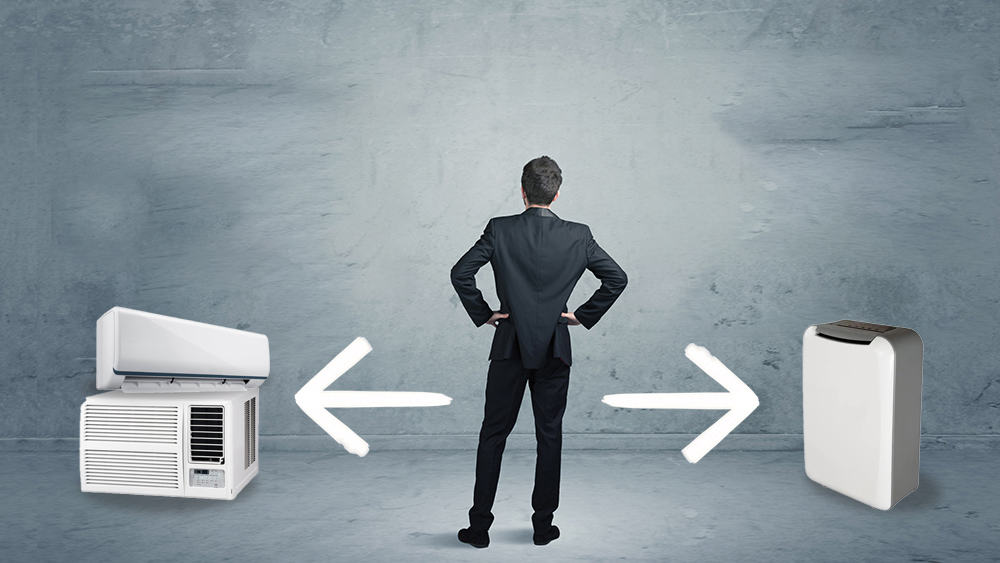
Key Takeaways
- ACs are primarily designed to cool indoor spaces. They also remove moisture as a part of their cooling process.
-
Dehumidifiers remove excess moisture and help maintain ideal humidity levels.
-
Climate, budget, and comfort preferences play a major role in deciding between an air conditioner and a dehumidifier.
When it comes to managing indoor climate, choosing between a dehumidifier vs. air conditioner isn’t always easy. Factors like climate, budget, health concerns, and energy efficiency all play a part.
If you live in a hot and humid area, an air conditioner is likely your best bet. It cools the room and removes some moisture at the same time. But if your space is cool, damp, or prone to mold, like a basement or a coastal home, a dehumidifier may be a better choice. And in many cases, using both together can give you the most comfortable environment.
In this guide, we’ll break down how each device works, when to use them, and how to decide what’s right for your home.
Dehumidifier vs. Air Conditioner – What’s the Difference?
While an air conditioner is primarily used to cool your home, it also removes humidity from the air as a consequence. But the volume of moisture removed is not such a great quantity. This is where a dehumidifier is more efficient; it can remove a high amount of moisture at a given time.
When considering the best option for your space, understanding the role of both a dehumidifier and an air conditioner can help you achieve optimal comfort and air quality.
|
Air Conditioner |
Dehumidifier |
|
|
Primary Function |
Cools the air |
Removes moisture from the air |
|
Humidity Control |
Moderate humidity reduction |
High humidity reduction |
|
Ideal Use Case |
Hot and humid environments |
Damp, musty, or mold-prone areas |
|
Cooling Capability |
Yes |
No |
|
Energy Use |
Higher (especially for cooling large areas) |
Generally lower |
|
Price Range |
High upfront cost |
Low upfront cost |
How Does an Air Conditioner Work?
An air conditioner removes heat and, as a byproduct, removes moisture from the air. The process starts when warm indoor air passes over cold evaporator coils, which are filled with refrigerant. This refrigerant absorbs the heat, resulting in cool air. A fan then circulates the cool air back into the room.
The now-warmed refrigerant moves to the compressor and then the condenser (usually outside your home), where the heat is expelled. The refrigerant cools down again, turns back into a liquid, and the cycle repeats.
You can opt for a central air conditioner for even cooling throughout your home, or you can go for room air conditioners (mini-splits, window ACs) for targeted cooling in individual rooms. The type of air conditioner you buy depends on the size of your home, location, and budget, so be sure to do your research beforehand!
Pros and Cons of Air Conditioners
|
Pros |
Cons |
|
Reduces the amount of heat in the room |
High energy usage |
|
Reduces moderate amounts of humidity |
Maintenance and installation costs |
|
Can be used as a fan as well |
High initial costs |
How Does a Dehumidifier Work?
A dehumidifier, on the other hand, doesn’t cool the air — it just pulls moisture out of it. Most models use a fan to draw humid air over cooled coils, causing the water vapor to condense. This water then collects in a tank or drains through a hose, depending on the setup.
Once the moisture is removed, the air is reheated slightly and released back into the room, drier, but not cooler.
Dehumidifiers can be either portable units for single rooms or integrated whole-house systems, depending on your needs.
Pros and Cons of Dehumidifiers
|
Pros |
Cons |
|
Reduces the amount of humidity in the room |
Provides little to no cooling |
|
Greatly reduces the growth of mold and fungi |
Additional energy expense |
|
Portable units can be set anywhere in the room |
|
When Should You Use a Dehumidifier vs. an Air Conditioner?
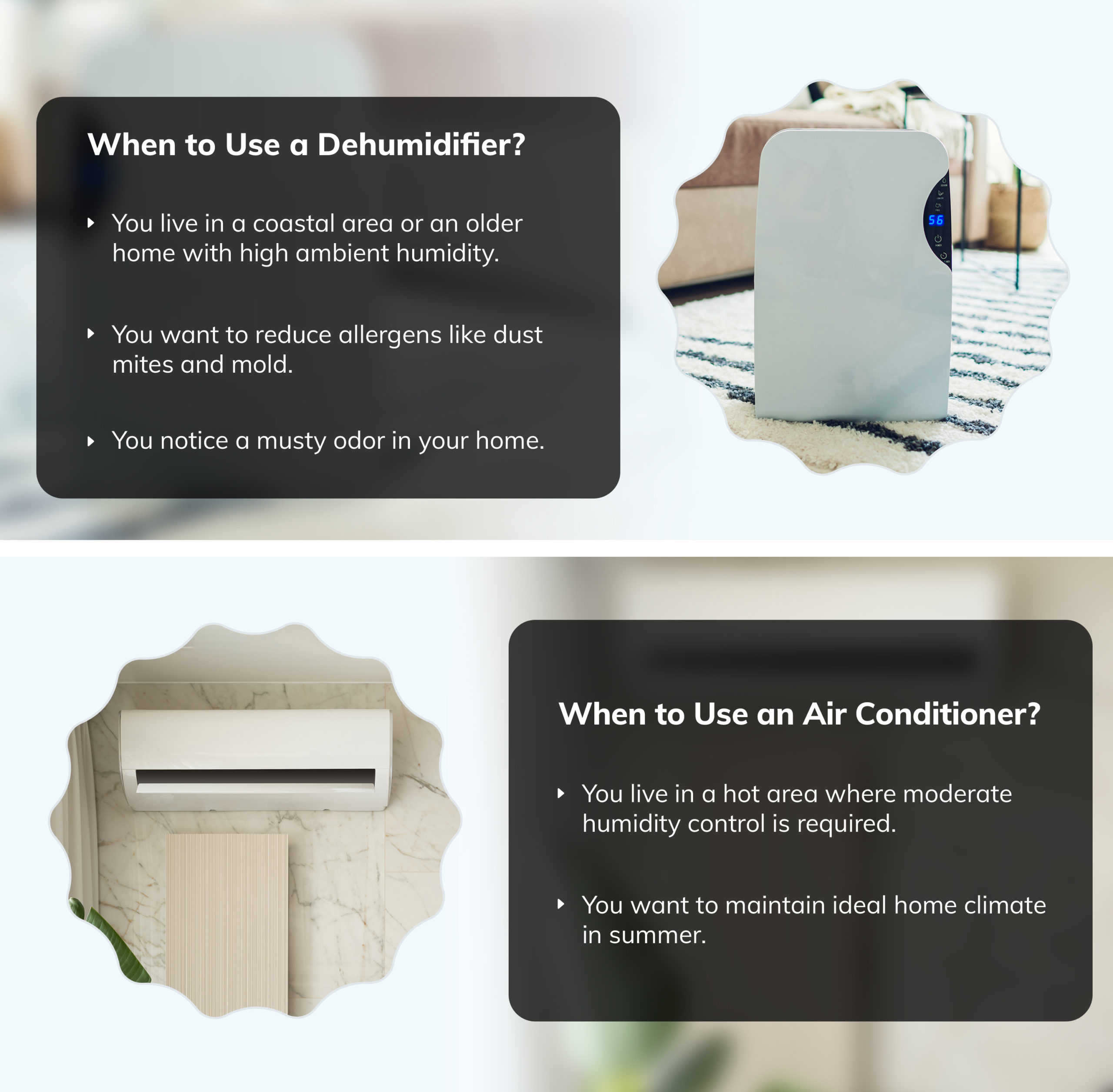
The choice of which appliance to opt for depends heavily on your personal preferences, budget, living location, and design of the house.
-
Climate
If you’re looking to cool down your house with moderate humidity control, an air conditioner is a solid choice. Air conditioners are designed to cool the room and, by extension, reduce some moisture in the air.
Coastal homes face consistently elevated humidity levels due to their proximity to large bodies of water, which increases the amount of moisture in the air. Older homes, particularly those lacking proper ventilation or insulation, are especially vulnerable to moisture buildup. In these scenarios, relying solely on an air conditioner may not be enough to manage moisture effectively. This is where using both a dehumidifier and AC can provide a more balanced approach to temperature and humidity control.
You can also add portable dehumidifiers in areas such as bathrooms, laundry rooms, storage areas, and basements, where moisture control is highly important.
-
Cost
When comparing the cost of a dehumidifier vs. an air conditioner, dehumidifiers come out ahead when it comes to upfront and installation costs.
Installing a whole-house air conditioner can cost between $4,000 and $8,000. Room air conditioners, such as mini-splits, cost around $500 to $9,200.
In contrast, a whole-house dehumidifier typically costs $1,500 to $3,500 to purchase and install. If you don’t need to manage humidity throughout the entire home, a portable dehumidifier is a much more budget-friendly option. It requires no professional installation and costs only $250 to $450.
-
Indoor Air Quality
Both an AC and a dehumidifier can improve indoor air quality. AC filters remove dust, debris, and various indoor pollutants, so they don’t impact your air quality.
A dehumidifier helps purify the air by preventing mold, mildew, and dust mites. This is especially beneficial for people with allergies, asthma, or other respiratory conditions, as mold and mildew can worsen their symptoms.
Dehumidifiers can also slow down the growth of dust mites by keeping your home humidity levels at 50% or lower.
-
Energy Efficiency
An air conditioner cools the air, condenses it, and removes excess moisture, all of which require significant energy consumption. Plus, they have to run for a considerable time to perform their function, and this also means more energy.
Dehumidifiers don’t cool the air; they simply remove moisture and therefore consume less energy. They often need to run for that long to perform their function, requiring much less electricity.
For those looking to balance cooling and energy efficiency, ACs with a dehumidification function, like a dry mode, can offer a practical solution. They provide both temperature control and moisture management in one system.
Achieve Ideal Humidity Levels Using Smart Controls
Smart thermostats make it easy to achieve and maintain ideal humidity levels in your home. If you have ductless AC systems like mini-splits, you can opt for smart thermostats for mini-splits like Cielo Breez. They have built-in humidity sensors, allowing you to track room conditions in real time. What’s more, you can set up the humidity range that you want in your room, and they will automatically make adjustments to maintain that.
Your best choice to make any mini-split, window,
or portable AC smart. Enhance your comfort and savings.
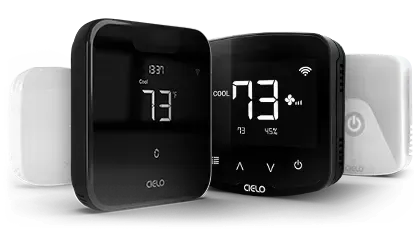
In case of central HVAC systems, you can opt for smart thermostats to be aware of your home humidity levels. You can also integrate your whole-house dehumidifier with your central HVAC and achieve ideal summer humidity using smart thermostats.
Equip your HVAC system with smart features and achieve the perfect balance between comfort & savings.
Learn more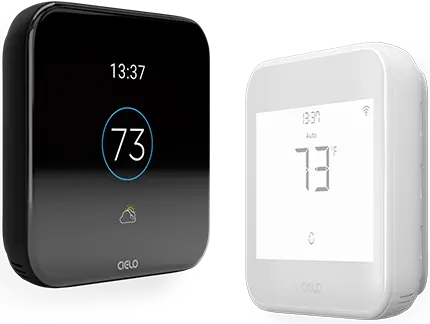
Frequently Asked Questions
Can I Use a Dehumidifier Instead of an AC?
A dehumidifier can’t cool your room, but it’s great for removing moisture. If you only need to reduce humidity, this might be your best bet. However, for cooling, you’ll need an air conditioner.
Can You Use Both an Air Conditioner And A Dehumidifier?
Yes, you can absolutely use a dehumidifier and an air conditioner together. The AC and dehumidifier combination is especially useful in hot, humid regions like Florida or the Gulf Coast. The combination of both appliances ensures that your space stays cool, dry, and comfortable.
Is There a Dehumidifier in an Air Conditioner?
Yes, most air conditioners have a built-in dehumidifying function. As the AC cools the air, it also removes moisture as part of the cooling process. However, the dehumidifier in an air conditioner is usually less powerful than a standalone dehumidifier, especially in very humid environments.
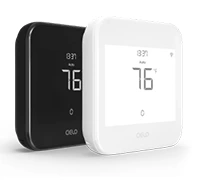
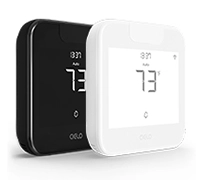
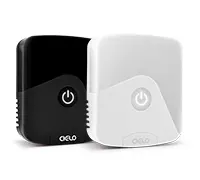
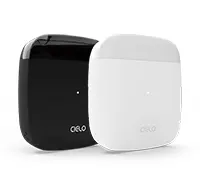
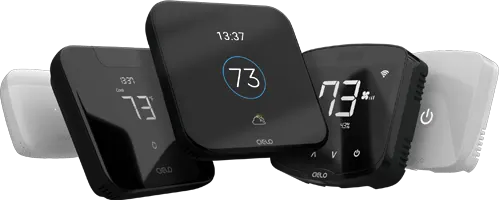
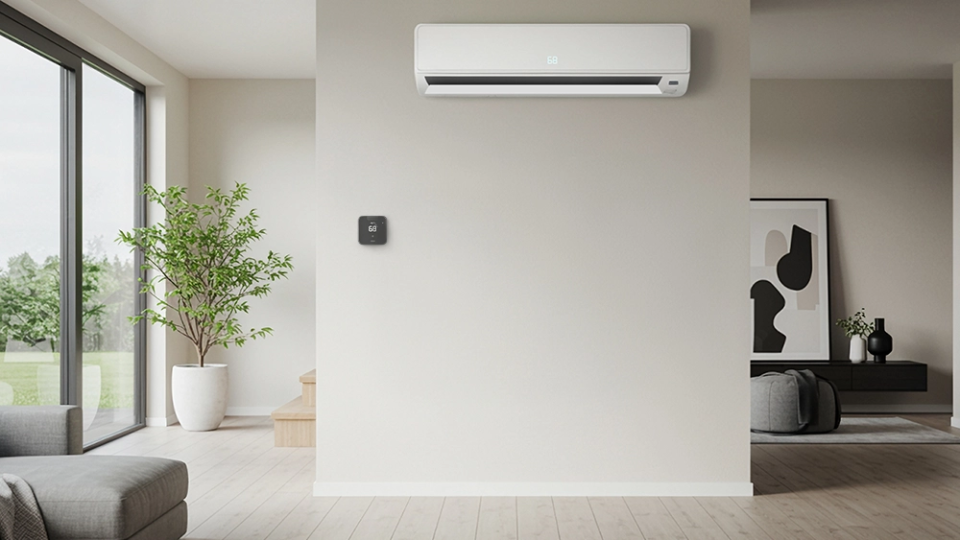

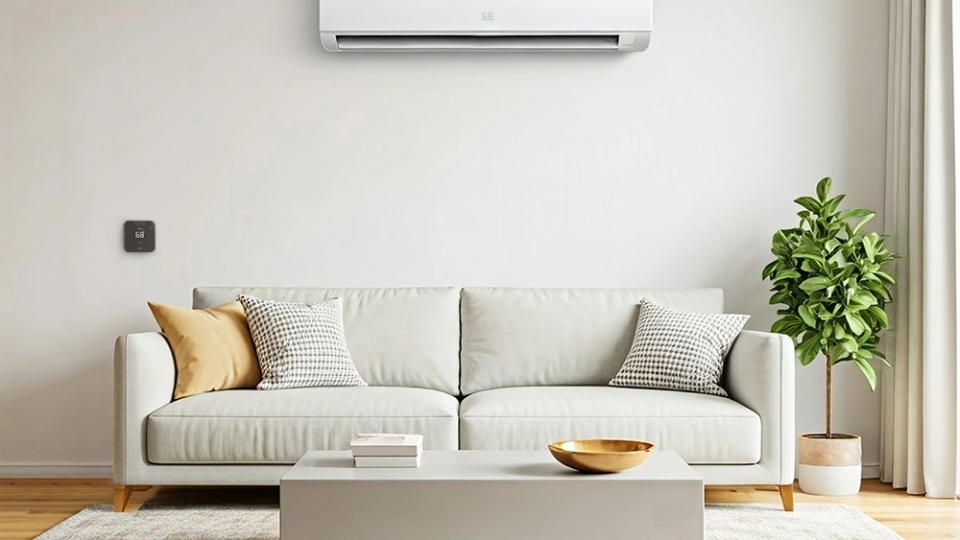
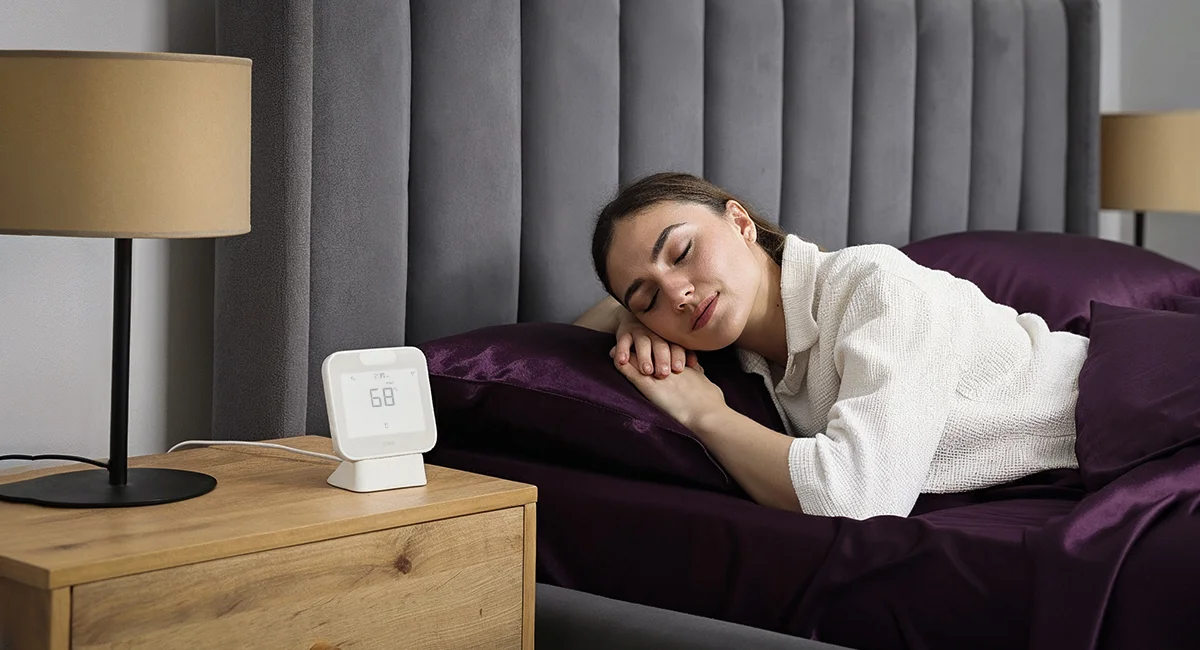
4 Comments. Leave new
It would seem that a big disadvantage of dehumidifiers is that the water container must be emptied by hand, sometimes several times a day, Where an A/C pipes the water outside continuously. No user intervention needed.
Great Article very informative
I have a portable air cond/dehumidifier/fan went thru window no tank to empty I use it mistle on dehumidifier I’m concerned about electricity cost which is cheaper running air conditioner or dehumidifier?
I have a Keystone 50-Pints dehumidifier in my office, I wouldn’t say it feels warmer but it feels fresher and it removes a lot of airborne dust around the room.